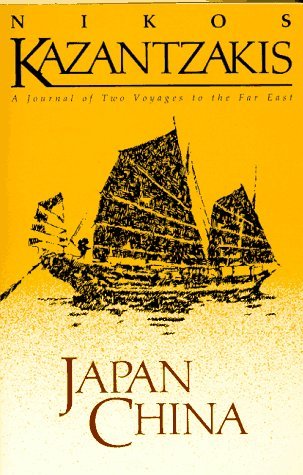What do you think?
Rate this book


384 pages, Paperback
First published January 1, 1938
Πρότζεκτ Νίκος Καζαντζάκης
1) Όφις και κρίνο (1906)
2) Σπασμένες Ψυχές (1908)
3) Ο Νίτσε εν τη Φιλοσοφία Δικαίου & Πολιτείας (1909)
4) Συμπόσιον (1922)
5) Ασκητική: Salvatores Dei (1927)
6) Ταξιδεύοντας Ρουσία (1956)
7) Ιστορία της Ρωσικής λογοτεχνίας (1930)
8) Τόντα Ράμπα (1934)
9) Λήμματα στο Εγκυκλ. λεξικόν Ελευθερουδάκη (1927-1931)
10) Ταξιδεύοντας Ισπανία (1937)
11) Ο πρωτομάστορας (Η θυσία) (1910)
12) Ταξιδεύοντας Αγγλία (1941)
χρόνος ανάγνωσης κριτικής: 40 δευτερόλεπτα
Σημείωση: Από ‘δω και στο εξής επειδή μεγαλώνει η λίστα με τα λινκς για
τις κριτικές μου πάνω στα βιβλία του Καζαντζάκη θα μπαίνει σε σπόιλερ ταγκ
για να μην τρώει χώρο.
Στα του βιβλίου τώρα.
Το καλύτερο ταξιδιωτικό του Καζαντζάκη.
Ο λόγος είναι διότι η περιττή, υπερβολική, και πλεονάζουσα (για μένα) φιλοσοφία
η οποία αφαιρούσε κάτι από την μαγεία του ταξιδιωτικού δεν υπήρχε
σε αυτό το βιβλίο
Υπήρχαν περισσότερες εμπειρίες από το τι είδε ο Καζαντζάκης παρά
φιλοσοφικές αναζητήσεις.
Για παράδειγμα από το μέρος στην Ιαπωνία μαθαίνουμε για το Θέατρο Νο,
τους βουδιστικούς ναούς, τις τελετές τσαγιού, το θέατρο Καμπούκι,
την τέχνη των λουλουδιώ�� Ικεμπάνα, τους βραχόκηπους,
τους σαμουράι και για πολλά άλλα.
Είναι χωρισμένο σε 3 μέρη. Το πρώτο στην Ιαπωνία, το δεύτερο στην Κίνα (1935)
και το τρίτο συμπληρωμένο από την Ελένη Καζαντζάκη
είναι από το τελευταίο ταξίδι του Καζαντζάκη εκεί το 1957 την χρόνια που πέθανε.
Έτσι βλέπουμε τις εμπειρίες του Καζαντζάκη μέσα και από τα μάτια
της συντρόφου του Ελένης, η οποία συμπληρώνει και σχολιάζει τις σημειώσεις
που κράτησε ο Καζαντζάκης από αυτό το ύστατο του ταξίδι.